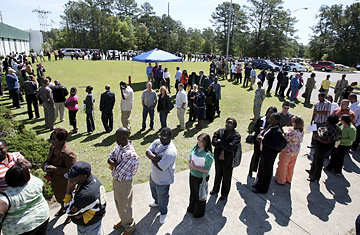
Hundreds of job applicants stand in a snaking line in Hanahan, S.C.
A number of prominent American economists believe that the American economy has permanently lost its resilience and vitality. They believe that, for the first time in memory, America cannot rebuild itself after a severe economic cataclysm and that the business base of the country is not creative enough or elastic enough to come back to where it was just two years ago.
Bloomberg recently reported "Fallout from the recession implies a 'markedly higher' natural rate of unemployment, says Edmund Phelps, a professor at Columbia University in New York and winner of the 2006 Nobel Prize in economics. "It was 5.5 percent; maybe it will be 6.5 percent, maybe 7 percent." Phelps has a number of equally qualified experts who agree with him. (See pictures of Cleveland struggling with unemployment.)
The industrial, financial, and retail jobs destroyed over the last three quarters cannot be recouped in the dozen quarters that lie immediately ahead, if Phelps view, which is a remarkably dark vision of America's future, is right. This desperate image of the national economic life assumes that the innovative power of American business cannot build another huge sector the way that it did in the 1970s with the rise of the great technology companies like Microsoft (MSFT), Intel (INTC), and Cisco (CSCO), and twenty years later Google (GOOG) and the second reincarnation of Apple (AAPL), which was built on nothing more than the ingenuity behind the iPod and the Mac. (See pictures of the iPhone.)
The inability to see a future when unemployment will be no better than 7% may be born of the deep pessimism that has seized the thinking of many analysts as they are in the midst of this dismantling of what it took the business community three decades to create. The reason that their forecasts may be wrong is that they are born of despair more than logic, just as the forecasts of permanent prosperity that were prevalent five years ago were born out of the mania caused by a historic inflation of real estate, unprecedented leverage, and ballooning stock markets.
All of the programs currently being created by the national government will be failures if Phelps and his colleagues are right. Or, better said, the programs will only build jobs for a short period. The rise in employment because of federal intervention will disappear when the government can no longer afford to pay for the buttressing or the electorate turns against the deficit that the spending programs build. The Administration's plan, which has been so heatedly debated, to save 3 million to 3.5 million jobs, will only be an elaborate trestle with its base set on limestone.
The corollary of the thesis that America has exhausted its ability to create employment even though the population in the country is no longer growing rapidly is that any expansion in innovation or increased industrial activity will happen somewhere else. That place or those places have already been identified as India, China, and the other vibrant economies of southern Asia and Latin America. The case in their favor is simple. They have cheap labor. But, cheap labor is itself exhaustible. China has created a middle class, and so has India. The people in those middle classes will expect to be paid better and better over the years ahead. (See pictures of China going to Africa.)
America has a class of cheap labor now as well, which the country does not want to face. In doing so, the nation has to admit to itself that the millions of manufacturing jobs with high hourly wages, lifetime benefits, and a pension will not be part of the economy in the future. That is true. The U.S. manufacturing base cannot be competitive if it keeps the legacy benefits that unions like the UAW negotiated for their members in the years that Walter Reuther ran the union.
The theory that the unemployment rate will never go back to 5.5% is wrong. It is wrong because the American imagination for creating new large industries has not disappeared. It is wrong because the new economy in the United States will include a large number of manufacturing jobs paying wages which are historically low. It is easy to say that manufacturing can never prosper in America because the fixed prices for labor are too high. The recession has broken the grip of expensive labor. Manufacturing can and will return to the United States. American workers will work on assembly lines. They will be employed but their standard of living will go down. They cannot have jobs if it doesn't.
There is a diversity of thinking about where America's next large wave of employment will come from. It may be alternative energy businesses. One hundred and twenty years ago no one would have believed that the oil industry would be one of the largest employers in the country. The biotechnology industry may grow large enough to be the size of the pharmaceutical industry was a few years ago. Or, the next large opportunity to create jobs may be as improbable as the technology revolution was as recently as the 1960s.
— Douglas A. McIntyre
See the 25 people to blame for the financial crisis.
For constant business updates, go to 24/7wallst.com.
